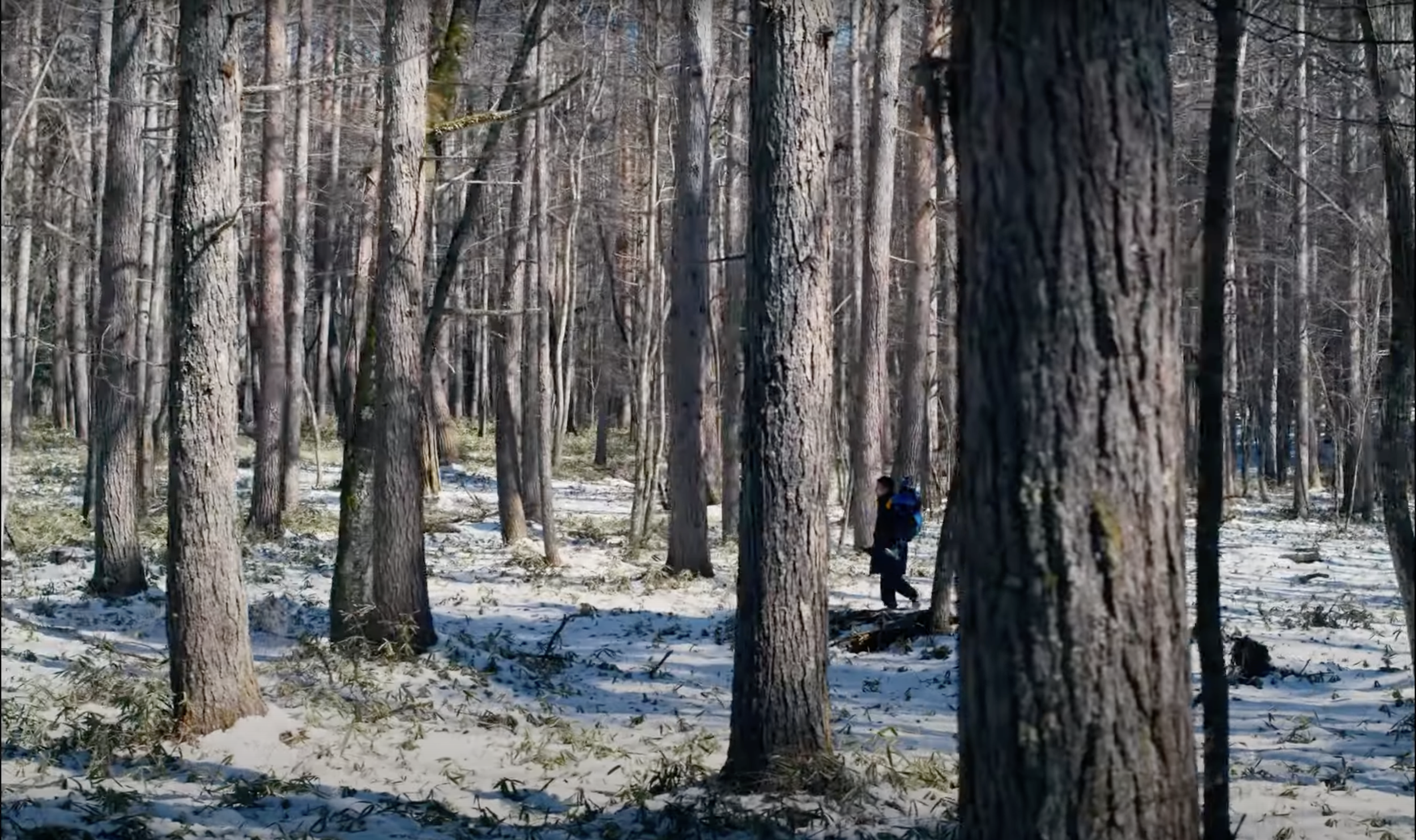Aku wa sonzai shinai - Evil Does Not Exist Directed by Ryûsuke Hamaguchi
Aku wa sonzai shinai - Evil Does Not Exist
Directed by Ryûsuke Hamaguchi
Starrings: Hitoshi Omika, Ryô Nishikawa, Ryûji Kosaka, Ayaka Shibutani, Hazuki Kikuchi, Hiroyuki Miura
Country: Japan
Year 2023
Review author: Roberto Matteucci
Click Here for Italian Version
“I work for my village”
In Shinto, nature (shinzen) has the characteristic of spontaneity:
“The creator is non-existent, and things are produced by themselves.” (1)
The scission between paradise and earth occurs; subsequently, the kami, the gods, arrive:
“ … the kami are men, but also «the extreme variety of birds, animals, trees and plants, no less than the mountains, the seas, and so on... “. (1)
Shinto is the "Way of the spirits" and spirits are everywhere, both in humans and nature.
Spirits through nature have always been in Japanese literature. Among contemporaries, the most famous is Haruki Murakami. He uses realism, adolescence, interiority, depression, the search for the meaning of life, mixed with imagination, dreams and magic. The world often becomes unreal, incomprehensible, and lacking in logic.
Writer Haruki Murakami collaborated with emerging director Ryûsuke Hamaguchi.
These artistic similarities can be seen in the film Aku wa sonzai shinai - Evil Does Not Exist, presented at the 80th Venice Film Festival. Its quality was recognised by the jury, awarding Ryûsuke Hamaguchi the Silver Lion Grand Jury Prize.
What are the essential points of commonalities with the spiritual genre and magical naturalism?
In a small community in a mountainous region of Japan, life unfolds peacefully, apparently idyllically, with strong human relationships, sincere friendship, simple gestures, healthy food, and fresh water. All around, there is a pure, vigorous nature. Snow, arbours, streams. Inhabitants and nature coexist serenely, without conflict.
In the beginning, there is a little girl, Hana, in a forest. It is winter, but the snow is melting. A man is cutting wood, nearby, there is a house and some cars. He is Takumi, Hana's father. There are no words, no noise, just a silent, spontaneous paradise.
After this long introduction comes the conflict, the threat to the worrying community.
Two mediators from a Tokyo corporation arrive in the village. Their society plans to build a glamping site on their territory. Glamping:
“Glamping is a portmanteau of "glamorous" and "camping", and describes a style of camping with amenities and, in some cases, resort-style services not usually associated with "traditional" camping. Glamping has become particularly popular with 21st-century tourists seeking modern amenities, such as Wi-Fi,[1] alongside "the escapism and adventure recreation of camping", in a variety of accommodations such as cabins, treehouses, and tents.” (2)
Tout court, it is an elegant way for the wealthy to destroy nature without having the sense of guilt that poor people do. They use their wealth to camp in luxury, ignoring the consequences.
The main consequence for the village would be the contamination of the uncontaminated water. The septic sank's would be polluted by the wealthy glampers, causing the destruction of Eden.
The citizens in the meeting rejected the idea as unsafe and dangerous to the social order.
In the epilogue, Hana disappears and everyone looks for her. She is with a deer.
What about the intermediaries, who returned on behalf of the corporation to convince the residents? What is their punishment?
Takumi knows this well.
The director's arguments are existential, impressive. Beginning with ethical and moral considerations, such as the concept of evil. Does evil exist? Ryûsuke Hamaguchi says:
“I want the title to help put forward a thought for people, because ultimately I don’t know whether evil exists or not,” he explains. “But I think it’s hard to say that it doesn’t exist after watching this film; I don’t think you can completely say so.” (3)
Well, yes. After watching the film, the existence of evil becomes undeniable. Maybe this security was also before? However, the question should be different: why does evil arise and make rash gestures in a charming village? Why does it affect nature, in shinzen, where kami are born? Evil does not exist? Obviously, it exists since nature is not innocent either. Ryûsuke Hamaguchi states it:
“I was looking at nature and the title was a naturally occurring idea as you see in the film. In the beginning, you see the trees passing by and see the young girl. In a sense, it’s from the girl’s perspective. I think that anyone watching from the very beginning would not think that evil doesn’t exist in this kind of environment. Of course, there are plenty of things that are violent that happen in nature — earthquakes, tsunamis, etc. But I don’t think that anyone would say these things are evil; they’re just naturally occurring. I was using this title as my project title and I don’t think that anyone watching this film would come away with this idea that evil doesn’t exist but there was a special tension happening between the title and the narrative of the film so I decided to keep it.” (4)
Violence belongs to nature. The director does not exceed the alert level, but those who live there, like Takumi, are aware of the multitude of aspects of nature.
When the lion bites to eat a mild zebra, is nature good or bad? It is bad, at least for the harmless zebra. It is good for the lion, it is its only way to survive. Takumi is like a lion. Glamping is awful, so killing to defend the community is a crime or self-defence?
There is not just one protagonist but a vast number of people in a single character. They are the villagers. They are herons, patiently waiting for prey. They have a particular way of having fun.
The dwellers do not seem anxious. They are undoubtedly not apathetic. They are not weak but they are suspicious and probably self-destructive. They are hieratic, aware of the presence of spirits in immaculate territories.
And they are a little selfish, their environment is inviolable and they do not want to share it. They are angry, irascible with those who try to pollute them. And they are also bad; does evil arise from them?
What style and language does the director use? Absolutely abounds in trees, snow, rivulets, animals, wood. He creates a feeling of claustrophobia when he shoots the foliage of the trees from below and the little girl walks around, observing, knowing all the names of the plants. The forest is a closed habitat, just as the village is closed. The dominant nature is also composed of the father, the daughter, and the entire population.
And there is the magic of the deer. It appears. It disappears. It is majestic in its beauty. Is the deer a spirit? Is the deer to lead the community?
The water is immaculate. Fresh, crystal. So limpid that it can be picked up with a ladle and poured into a tank. Water qualities also affect restaurant noodles in the village. They are exquisite.
The colour is clear and clean; it makes the area heavenly. Paradise needs silence, so the scenes continue without dialogue, very long sequences, and many, many trees.
In a wild place can not miss the natural wasabi to create the metaphor of ecological exaggeration.
The structure includes an extensive eco-friendly introduction. It is deliberately necessary for this type of film. Then, the controversy begins with Takahashi and Mayuzumi, elusive and insincere delegates of the company. They are guilty of being an invasive danger to a harmonious community. The conflict with the local population is intense, even a bit racist, as when a young man from the village refuses to greet them and turns his back on them.
They represent their opposite. They are from Tokyo. They reflect themselves in the modern capital, with high density, with relations more and more complicated and insensitive. During the car journey, they talk a lot about their lives, their relationships. They are dissatisfied, discouraged, sad, alone, and without romantic partnerships. They discuss about apps to find a partner, but even this attempt has failed miserably. The pandemic and the isolation of quarantine have increased their loneliness and discontent. They are disheartened. The encounter with a totally different life elevates their desolation. The man would like to change. He wants to try cutting wood. At first sight, it could be easy, but it turns into an impossible activity. Only Takumi's outwardly banal and naive suggestions clear his mind and allow him to chop wood.
The plot twist is the open ending. All interpretations are right since there is no exact answer. This conclusion is intentionally inscrutable, as the filmmaker confirms:
“Confusion is what I wanted.” (5)
Brain confusion is pleasant, but there is more:
“I think the way to answer this is that I’m actually looking forward to seeing how audiences will interpret this. I did have some preview screenings and heard surprising interpretations from people so I’m looking forward to being surprised. There are some ideas within me but ultimately I want people to enjoy the ending. Part of me also wants people to feel a certain kind of hesitation towards it as well. That idea of hesitation is cinema.” (6)
The open ending is a game. An intellectual reflection, a provocation, a philosophical speculation on evil.
If this is the aim, the result is excellent. Apparently slow, the film has rhythm, emotion, tension, suspense, psychological attraction of the characters, dialogue motivation, Japanese culture, intelligent literature.
The atmosphere is sharp and brilliant, the chromaticism is perfect, the moral elements of good and evil are confused, overturned until they demonstrate the contrary: evil is in good, in the green paradise and its residents.
Leonardo Vittorio Arena, Lo spirito del Giappone. La filosofia del Sol Levante dalle origini ai giorni nostri, I edizione BUR Saggi, Milano, gennaio 2008 Translated by authour
Alex Denney, “Ryusuke Hamaguchi on Evil Does Not Exist: “I Love Being Puzzled”, 7 settembre 2023,https://www.anothermag.com/design-living/15094/ryusuke-hamaguchi-evil-does-not-exist-interview-venice-film-festival
Nobuhiro Hosoki, “NYFF : Evil Does Not Exist : Q&A with Director Ryusuke Hamaguchi”, October 25, 2023,https://cinemadailyus.com/interviews/nyff-evil-does-not-exist-qa-with-director-ryusuke-hamaguchi/
Alex Denney, “Ryusuke Hamaguchi on Evil Does Not Exist: “I Love Being Puzzled”, 7 settembre 2023,https://www.anothermag.com/design-living/15094/ryusuke-hamaguchi-evil-does-not-exist-interview-venice-film-festival
Michael Rosser, Ryusuke Hamaguchi talks ‘Evil Does Not Exist’: “It felt like shooting a film for the first time”, 4 September 2023, https://www.screendaily.com/features/ryusuke-hamaguchi-talks-evil-does-not-exist-it-felt-like-shooting-a-film-for-the-first-time/5185547.article





















Revenge and forgiveness belong to three Mexican boys intent on organizing their retaliation in the film A cielo abierto - Upon Open Sky by directors Mariana Arriaga and Santiago Arriaga presented at the 80th Venice International Film Festival.